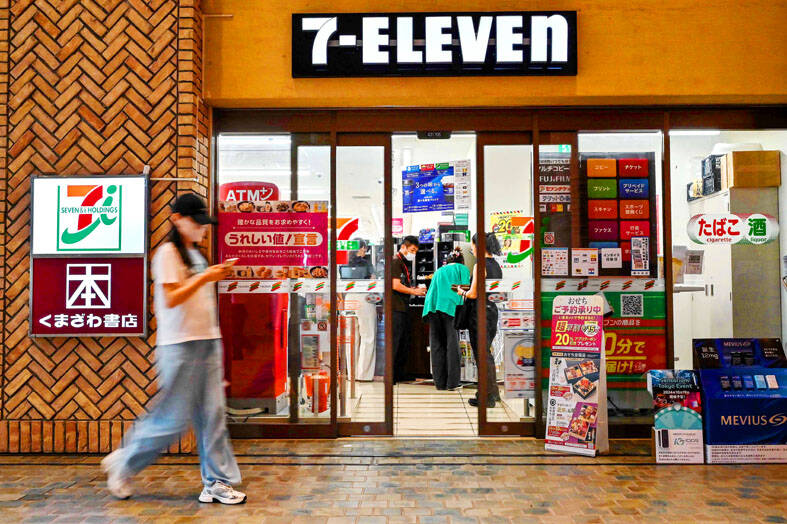Canadian retail chain Alimentation Couche-Tard Inc is dropping its proposal to acquire Seven & i Holdings Co, the Japanese operator of the 7-Eleven convenience store chain, citing frustration in ongoing negotiations that showed “a lack of constructive engagement.”
The 7-Eleven parent company rejected an offer last year, but Couche-Tard, which runs the global Circle K chain, was still interested and tried to coax a deal with the Japanese chain, known in Japan as “conbini.”
In a letter dated on Wednesday and sent to the Seven & i board, Couche-Tard stressed it had made a good offer earlier this year in a proposal of ¥2,600 (US$17.49) per ordinary share in cash, which it said represented a 47.6 percent premium to the stock price. The initial offer, made last year, was for ¥2,200 per share in cash.

Photo: AFP
In the letter, sent to media Thursday and signed by its two top executives, including founder Alain Bouchard, Couche-Tard expressed exasperation at the response it was getting from Seven & i despite repeated attempts at dialogue.
“We have been very patient and respectful throughout this process, beginning with our meeting on July 23, 2024,” the letter said.
“You have engaged in a calculated campaign of obfuscation and delay, to the great detriment of 7 & i and its shareholders. We believe this approach reinforces our concerns about your approach to governance. Based on this persistent lack of good faith engagement, we are withdrawing our proposal,” it said.
Couche-Tard, which runs nearly 17,000 stores in more than 30 countries and territories, including the US, said the documents it got lacked key information, executives were no-shows at meetings and the meetings it did have ended up being “readouts” of statements, not frank discussions.
Seven & i acknowledged the dropped offer Thursday and said it considered talks “in good faith and constructively.”
“We remain fully committed to our standalone value creation plan, which we have been pursing in parallel, and to unlocking the value of our businesses, including our North American convenience store business. Our plan is concrete and actionable,” it said in a statement.
The 7-Eleven franchise, which spans more than 85,000 stores in Japan, the US and Europe, has a new chief executive, Stephen Hayes Dacus, the first foreigner tapped to head 7-Eleven. Dacus, an American whose mother is Japanese, has promised a leaner business by focusing on the supply chain and tailoring shop offerings to various regions.
For the first quarter of this fiscal year, Seven & i reported a doubling in profits to ¥49 billion, mainly due to previously announced sales of property and equipment at its Ito-Yokado Co retail chain.
Quarterly sales held up, as a favorable exchange rate helped some overseas earnings, it said.

AI BOOST: Although Taiwan’s reliance on Chinese rare earth elements is limited, it could face indirect impacts from supply issues and price volatility, an economist said DBS Bank Ltd (星展銀行) has sharply raised its forecast for Taiwan’s economic growth this year to 5.6 percent, citing stronger-than-expected exports and investment linked to artificial intelligence (AI), as it said that the current momentum could peak soon. The acceleration of the global AI race has fueled a surge in Taiwan’s AI-related capital spending and exports of information and communications technology (ICT) products, which have been key drivers of growth this year. “We have revised our GDP forecast for Taiwan upward to 5.6 percent from 4 percent, an upgrade that mainly reflects stronger-than-expected AI-related exports and investment in the third

Mercuries Life Insurance Co (三商美邦人壽) shares surged to a seven-month high this week after local media reported that E.Sun Financial Holding Co (玉山金控) had outbid CTBC Financial Holding Co (中信金控) in the financially strained insurer’s ongoing sale process. Shares of the mid-sized life insurer climbed 5.8 percent this week to NT$6.72, extending a nearly 18 percent rally over the past month, as investors bet on the likelihood of an impending takeover. The final round of bidding closed on Thursday, marking a critical step in the 32-year-old insurer’s search for a buyer after years of struggling to meet capital adequacy requirements. Local media reports

TECHNOLOGICAL RIVALRY: The artificial intelligence chip competition among multiple players would likely intensify over the next two years, a Quanta official said Quanta Computer Inc (廣達), which makes servers and laptops on a contract basis, yesterday said its shipments of artificial intelligence (AI) servers powered by Nvidia Corp’s GB300 chips have increased steadily since last month, should surpass those of the GB200 models this quarter. The production of GB300 servers has gone much more smoothly than that of the GB200, with shipments projected to increase sharply next month, Quanta executive vice president Mike Yang (楊麒令) said on the sidelines of a technology forum in Taipei. While orders for GB200 servers gradually decrease, the production transition between the two server models has been

ASE Technology Holding Co (日月光投控), the world’s largest integrated circuit (IC) packaging and testing supplier, yesterday announced a strategic collaboration with Analog Devices Inc (ADI), coupled with the signing of a binding memorandum of understanding. Under the agreement, ASE intends to purchase 100 percent shares of Analog Devices Sdn Bhd and acquire its manufacturing facility in Penang, Malaysia, a press release showed. The ADI Penang facility is located in the prime industrial hub of Bayan Lepas, with an area of over 680,000 square feet, it said. In addition, the two sides intend to enter into a long-term supply agreement for ASE to